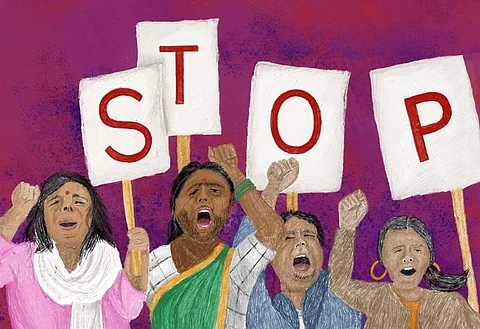

In a bizarre turn of events, not one but two different men on not one but two different Air India flights decided to urinate on women co-passengers. Mid-air. At least one of them in business class. Within ten days of one another—one in November, on a Paris-New Delhi flight, and one in December, on a New York-New Delhi flight. These incidents are acts of physical violence and fall within the broader category of sexual abuse.
Both men were inebriated, which is no excuse at all. One does not simply violate another person’s space, will, body, or rights just because one is drunk. Such violations occur only when the perpetrator already has a deep-seated sense of entitlement. Liquor has a way of uncloaking true colours. Morals or personalities don’t morph because of alcohol —but inhibitions about openly displaying them are lowered.

Nobody deserves to have the moment of their greatest humiliation become that which creates their greatest recall value—be it among the public or within their own circles. In these cases, the two women who suffered these indignations are the ones who deserve protection of identity. The perpetrators—not as much. Their names are in the press. The second perpetrator has lost his job as the vice-president of a bank, and been sentenced to two weeks’ judicial custody during an investigation.
The second case has captured more public attention than the first, perhaps because of its strangely imitative nature. One hopes this does not become a series—another point on the ugly list of ways in which Indian men routinely, habitually, and arguably even with sociocultural sanction harass, mistreat, and disquiet women.
The response of the crew members aboard that second flight, on the Paris-New Delhi sector, is also reprehensible. Not only did they reportedly try to convince the victim to return to the dirtied seat, but they also accompanied the perpetrator to a mid-air mediation to apologise to her and request that she not press charges. They then let him disembark the plane as usual, without alerting the authorities about the incident.
Drunken people who display physical aggression can be scary to be around, certainly.
To work on an airline is also incredibly stressful in general. But still—here, they essentially sided with the aggressor, rather than isolating the distressed passenger and allowing her to recover from the shock (they refused her an empty seat in first class after the incident), while quietly making the necessary calls to ensure the aggressor would be dealt with ethically later. Aside from being dereliction of duty, this is reminiscent of the many mundane ways in which victims’ experiences are minimised.
But these incidents do hack at the common notion that economic privilege and basic decency go hand in hand, an idea that perpetuates vast private exploitation, as well as discrimination against those of lower economic stratas on the basis of stereotypes. Clearly, this kind of thing can happen in business class, and become all of our business through the media. But the deeper rot in society from which vile behaviour arises is always our business really, and not only when it happens in sensational ways.
Sharanya Manivannan
@she_of_the_sea
The columnist is a writer and illustrator